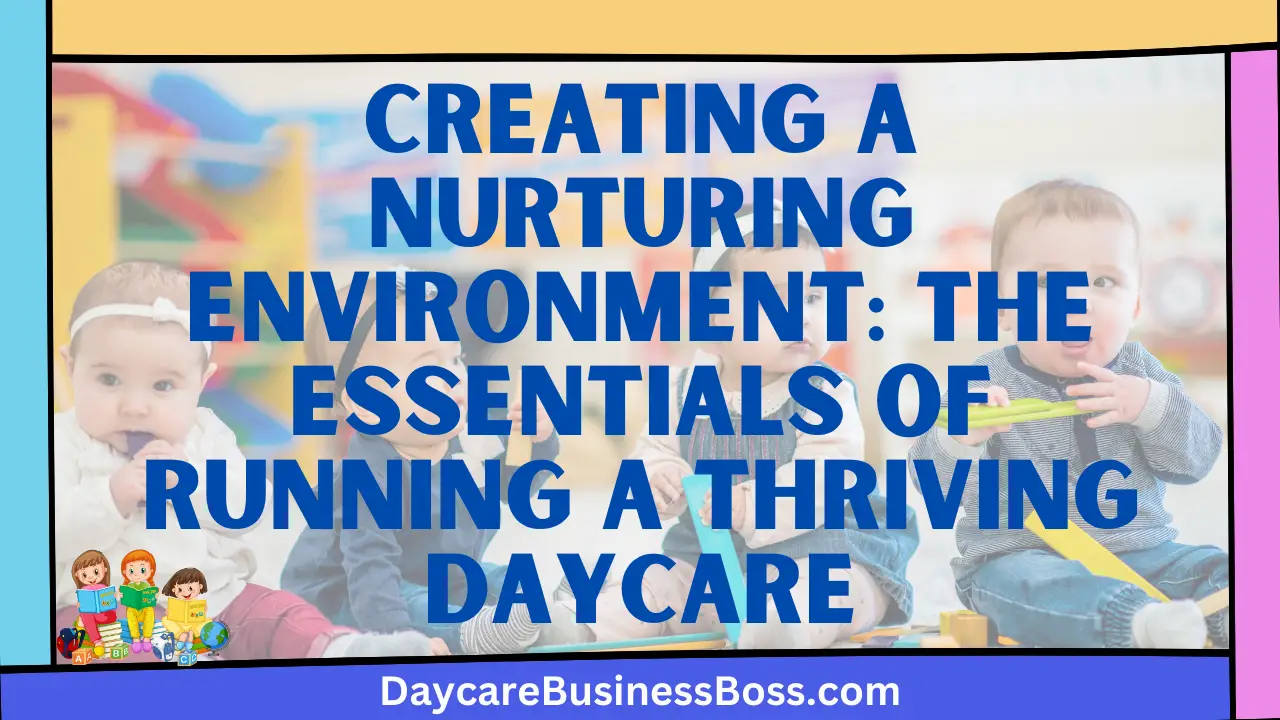Daycare management is a fulfilling undertaking that entails nurturing and molding the lives of young children during their early years. Whether you’re motivated by a love of education, a desire to create a secure and supportive environment for working parents, or a combination of the two, the road to effectively operating a daycare is paved with essential elements.
To run a daycare, you need a well-equipped facility, appropriate licenses, trained and caring staff, established safety procedures, engaging educational and recreational activities for children, provision of balanced nutrition, and strict adherence to regulatory guidelines.
In this article, we’ll go into the fundamental details of running a daycare. Whether you’re a seasoned educator, a first-time entrepreneur, or a kind caregiver, knowing these fundamentals will put you on the right track to creating a haven for children’s holistic development and learning.
Well-Equipped Facility: Building the Foundation

The physical environment of a daycare has a significant influence on a child’s early experiences and development. It is the setting for a plethora of encounters, discoveries, and growth. The importance of a large and child-friendly facility cannot be emphasized, as it serves as the foundation for a child’s everyday excursions. This setting should be carefully designed to accommodate the wide range of activities that promote a child’s holistic development, easily shifting between fun and learning sessions.
The factors that add to the vibrancy and functionality of this environment are critical. Colorful and comfortable furniture not only adds visual appeal but also creates a sense of security and ease, allowing youngsters to interact with their environment pleasantly. The availability of age-appropriate toys promotes cognitive and social development by stimulating curiosity and imaginative play. Designating separate locations for various activities, such as reading corners, painting stations, and play zones, helps a child’s day to have structure and purpose.
Despite the beautiful looks, safety is the cornerstone. Childproofed areas allow tiny explorers to navigate their surroundings without taking needless risks, fostering a safe learning and play environment. Secure entry points ensure that the child is under the supervision of approved caretakers, which fosters trust and peace of mind for parents. Adequate ventilation not only benefits the child’s physical health but also improves the entire environment.
Read more about: Building a Strong Financial Foundation: Daycare Startup Expenses Unveiled
Appropriate Licenses: Legal Framework
The operation of daycare is a responsibility that includes rigorous adherence to regulatory regulations as well as a commitment to developing young minds. Obtaining the necessary licenses and permits is one of the first stages in starting a daycare. While the specifics differ by jurisdiction, these authorizations are critical in legitimizing the operation and safeguarding the welfare of the children entrusted to the facility.
Regulations that govern various aspects of the daycare’s functioning are central to these legal requirements. The maximum child capacity that the facility can accommodate is an important issue. This keeps the environment suitable for learning and play without jeopardizing safety or well-being. Equally crucial is the need for worker-to-child ratios, which ensures that each kid receives the attention and care that he or she requires from the daycare’s personnel.
In these legal requirements, health and safety norms take precedence. Daycares must maintain a degree of hygiene that protects children’s health, including sanitation standards and correct food handling. Compliance with fire inspections is required to ensure that the facility is properly equipped to manage emergencies and evacuation procedures.
Trained and Caring Staff: Heart of the Operation
Every thriving daycare has a staff that serves as the heartbeat that propels the children’s growth and development. The members of this team are educators, mentors, and nurturers who play an important role in molding the young minds entrusted to their care. Their qualifications, compassion, and training all contribute to the children’s general well-being and holistic development.
A daycare’s staff composition is an important factor in its quality. It is critical to have qualified professionals present. Staff members should preferably have backgrounds in early childhood education, allowing them to design and implement age-appropriate learning experiences. First aid training is vital for ensuring that prompt medical assistance is available if required, establishing a secure and safe atmosphere in which children can develop. A solid understanding of child psychology allows staff to respond appropriately to each child’s emotional and developmental needs, establishing an atmosphere that promotes both cognitive and emotional growth.
Aside from their credentials, the staff’s ability to establish a nurturing and instructive environment sets the tone for the daycare’s growth. Children’s general development must provide a warm and welcoming environment in which they feel comfortable and cared for. Building good relationships with each kid promotes a sense of belonging, trust, and emotional support, all of which contribute to the child’s social and emotional growth.
It is also critical to communicate well with parents. The ability of the staff to communicate a child’s development, needs, and milestones establishes a link between the daycare and the child’s family, fostering a holistic approach to care and learning.
Established Safety Procedures: Prioritizing Child Security

In the world of childcare, safety is an unwavering need that serves as the foundation of the entire business. Within this caring oasis for young minds, stringent safety measures pervade every aspect of the environment, creating a setting in which children can thrive with confidence and parents can entrust their precious children without reservation.
A daycare’s safety measures cover a wide range of critical areas, with a persistent dedication to ensuring each child’s well-being. Establishing emergency response plans is critical to ensuring that every member of staff is prepared to manage unexpected events smoothly. Regular fire drills not only train staff and students with evacuation protocols but also instill a sense of preparation that can be crucial in emergencies.
Comprehensive background checks, are a method that assures individuals engaging with children have the utmost integrity, recognizing the value of a trustworthy workforce. Child-friendly first aid training prepares employees to respond quickly to minor catastrophes, promoting a safe and caring environment for children.
Safety is also strategically incorporated into the physical space. Childproofing the environment reduces potential hazards, allowing children to explore and learn safely. Secure pick-up and drop-off protocols reinforce the protective cocoon, ensuring parents that their children are being watched over. An up-to-date register of approved personnel authorized to collect the children offers a strict yet necessary safeguard to ensure the protection of the youngsters.
Read more about: Crafting a Strategic Blueprint: The Key Elements of a Home Daycare Business Plan
Engaging Educational and Recreational Activities: Nurturing Curiosity
A childcare center is a dynamic atmosphere where learning and fun coexist, providing children with an environment that stimulates their natural curiosity while nourishing their overall development. The combination of education and pleasure is a critical component of a daycare’s ethos, producing an environment that both captivates and enriches young brains.
This synergistic method is built on engaging activities. These activities serve as catalysts for children’s cognitive, emotional, and physical development. Introducing age-appropriate instructional instruments builds the groundwork for knowledge acquisition, promoting a passion for learning from an early age. These tools help children understand new concepts and foster their curiosity, putting them on a path to lifelong learning.
Children can experiment, create, and invent by using creative arts and crafts as a canvas for self-expression. The joyful interaction with colors, textures, and forms fosters not just artistic talents but also emotional intelligence, as youngsters learn to express themselves via their creations.
Interactive games give meaning to recreation by combining enjoyment and skill development. These games increase cognitive talents, social interactions, and collaboration. Storytime sessions act as gateways to imagination and knowledge, igniting a love of literature and supporting language development.
A daycare experience is defined by its ability to strike a balance between scheduled learning and free play. Structured learning gives fundamental skills and information, whereas unstructured play fosters creativity, problem-solving, and decision-making. This balance promotes well-rounded development by allowing children to flourish emotionally, socially, and intellectually.
Provision of Balanced Nutrition: Healthy Growing Years
The importance of nutrition in children’s growth and development cannot be emphasized, making it a critical concern in daycare. A holistic approach to developing young brains includes not just cognitive and emotional enrichment, but also a focus on delivering well-balanced, nutritional meals and snacks that feed their bodies and minds.
Daycares, as extensions of children’s homes, should stress providing meals that are not only tasty but also meet a variety of dietary needs and preferences. A properly planned menu combining a variety of food categories is required to ensure youngsters obtain a balanced array of nutrients. Each nutrient contributes to the child’s general health and well-being, from proteins that aid in muscular development to vitamins that boost the immune system.
Daycares must be aware of allergies and cultural differences in addition to nutritional issues. Menus should be adjustable to suit allergies and sensitivities, ensuring that all children can safely participate in meals. Recognizing and appreciating varied ethnic food traditions, on the other hand, leads to a nurturing environment that values and embraces diversity.
Instilling healthy eating habits in children throughout their early years of childcare can have a lasting impact on their future. Early childhood dietary habits often remain into adulthood, influencing long-term well-being. Introducing children to a variety of nutritious meals promotes not only physical health but also a positive relationship with food, supporting a lifetime of informed dietary choices.
Strict Adherence to Regulatory Guidelines: Building Trust

Regulatory requirements serve as a compass, directing the quality and safety of daycare operations. These rules, which have been carefully crafted to safeguard the safety of children, serve as the foundation upon which trust between parents and the daycare is created. The diligent application of these criteria provides parents with the certainty that their children are cocooned in a cocoon of competent care.
The commitment to regular inspections is critical to adhering to these regulatory criteria. These regulatory body evaluations act as litmus tests for the daycare’s adherence to set criteria. By submitting to these rigorous examinations, daycares demonstrate their commitment to creating an environment favorable to children’s growth, learning, and safety.
Record-keeping is an important aspect of regulatory compliance. Keeping comprehensive records not only acts as evidence of compliance but also enables for continuous tracking of each child’s progress and well-being. From health records to emergency contact information, this material paints a complete picture of the child’s daycare experience.
Compliance with health and sanitation requirements is critical. Keeping the surroundings clean, sanitary, and safe benefits children’s general health and reduces dangers. Creating a healthy environment protects children from potential threats, emphasizing the daycare’s commitment to their safety.
The combination of these activities demonstrates the daycare’s commitment to quality and safety. Daycares establish an environment in which children thrive under the watchful eye of qualified caregivers by strictly adhering to regulatory rules. The trust established by this commitment extends to parents, who may entrust their children to the care of the daycare with the assurance that every aspect of their well-being is carefully attended to. Regulatory compliance in daycare operations is more than just a procedural necessity; it is a testimonial to the daycare’s unwavering commitment to providing a safe environment for children while providing parents with peace of mind.
Read more about: Building Trust in Daycare Selection: The Ultimate Evaluation Checklist
Frequently Asked Questions

What are the essential credentials for daycare workers?
A variety of qualifications is required for childcare personnel to deliver effective care. They should ideally be trained in early childhood education, child psychology, and first aid. Working with children experience, strong communication skills, and a loving disposition are also required. These credentials ensure that staff members can provide a safe, educational, and supportive environment for children.
How do I ensure that the children in my daycare are safe?
Child safety is of the utmost importance in a daycare setting. Create complete safety precautions, such as fire drills, secure entrance and exit procedures, and childproofing. Conduct complete background checks on all staff members and keep emergency contact information for each child up to date. Review and update safety procedures regularly to address changing demands and potential dangers.
What is the role of balanced nutrition in a daycare?
Nutritional balance is essential for children’s growth and development. Daycares should provide well-planned meals and snacks with a variety of nutrients to suit the dietary needs of children. Consider allergies, ethnic preferences, and portion sizes suited for children. Encouraging healthy food habits in children during their childcare years benefits their general well-being and lays the groundwork for a lifetime of excellent dietary choices.
To learn more on how to start your own daycare checkout my startup documents here.
The information provided by DaycareBusinessBoss.com (“The Site”) is for general informational purposes only. All information on the Site is provided in good faith, however, we make no representation or warranty of any kind, express or implied, regarding the accuracy, adequacy, validity, reliability, availability or completeness of any information on the Site. Under no circumstance shall we have any liability to you for any loss or damage of any kind incurred as a result of the use of the Site or Reliance on any information provided on the Site. Your use of the Site and your reliance on any information on the Site is solely at your own risk.
This blog post is for educational purposes only and does not constitute legal advice. Please consult a legal expert to address your specific needs. Terms and Conditions. (https://daycarebusinessboss.com/terms-conditions/)

Meet Shawn Chun: Entrepreneur and Childcare Business Fan.
I’m a happy individual who happens to be an entrepreneur. I have owned several types of businesses in my life from a coffee shop to an import and export business to an online review business plus a few more and now I create online daycare business resources for those interested in starting new ventures. It’s demanding work but I love it. I do it for those passionate about their business and their goals. That’s why when I meet a childcare business owner, I see myself. I know how hard the struggle is to retain clients, find good employees and keep the business growing all while trying to stay competitive.
That’s why I created Daycare Business Boss: I want to help childcare business owners like you build a thriving business that brings you endless joy and supports your ideal lifestyle.


